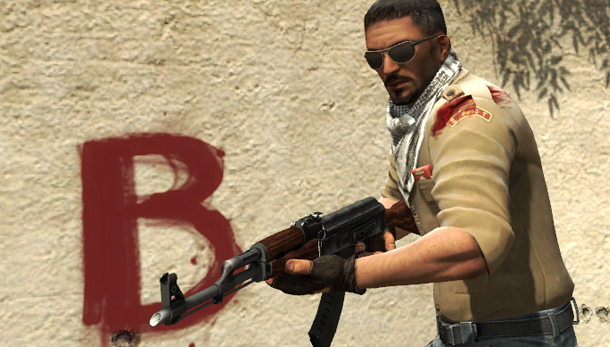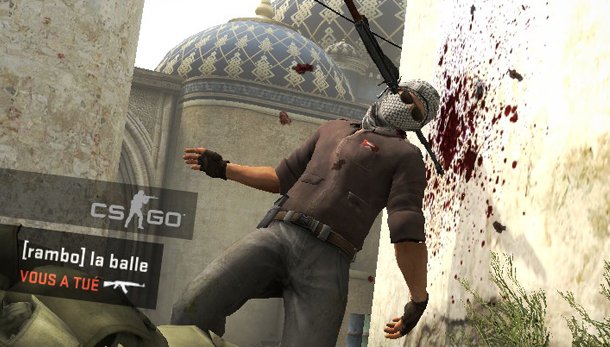What I learned about CS:GO after watching the Twitch stream of someone I beat

I played a vitamin D deficiency-fostering amount of CS:GO over the long weekend. In one of my dozen-some competitive matches (CS:GO's excellent five-on-five matchmaking mode), I noticed that one of my opponents was livestreaming . After we won, we booted up the archived video together, commenting in Mumble as we watched. It was a rare chance for my CS:GO group and I to see ourselves through an opponent's eyes (and comms)—what did it look like to play against us? These were my takeaways.
Here's the replay file of the match, if you're into that: steam://rungame/730/76561202255233023/+csgo_download_match%20CSGO-X8bCn-P5Cmw-MBvNv-naDSf-YYmQD
My mental picture of my opponents is completely wrong
I've won 107 competitive matches. My rank swings between Master Guardian II and Master Guardian Elite, which places me at the outer edge of average. At that level, 13th rank out of a possible 18, I expect a basic set of skills from opponents:
- Comprehensive map knowledge
- Smart money management
- Good marksmanship, anticipation, audio awareness
For the most part, our opponents had all of this. They won both pistol rounds against us (and the two “eco” rounds that followed). Their accuracy was good. Their rotations were a little slow on defense, but big deal.
I tend to assume, perhaps as a defense mechanism, perhaps out of insecure cowardice, that everyone I play a competitive game against is better than me. But watching the game from their perspective revealed a bunch of bad decisions and impulsive decision-making, stuff that's invisible to me when I'm not looking through the eyes of my enemy. At 7:15 the livestreaming player walks through smoke with a grenade pulled and dies; at 7:30 his teammate walks through the same smoke and dies. At 8:30 they again walk through smoke together to bombsite B. In round 13, down 8-4 (absolutely not an insurmountable deficit for the Terrorist side—they actually tie it 9-9 after switching to CT), and with $7700 in the bank, he buys an armor, a Desert Eagle, and a decoy grenade . Round 14, their plan is to rush through smoke on B, which they bicker over a bit before clumsily committing to. Second round, second half, he buys a Scout after winning the pistol round.
But beyond those avoidable mistakes... how can I put it? Over my hundreds of hours in competitive mode, some portion of which has involved being taunted and called a long list of creative insults, I'd painted this image of my hypothetical opponent being a hardcore, misanthropic, snarking, probably-racist with a chip their shoulder.
In reality, I was playing against someone barely out of their adolescence, 32-ounce Jamba Juice cup perpetually in-hand, who listens to EDM mid-match, and whose mom at one point barges in on him. Late in the match, presumably bored or having given up, he goes AFK multiple times to text on his phone. “I haven't showered in two days,” he confesses at 5:09.
The biggest gaming news, reviews and hardware deals
Keep up to date with the most important stories and the best deals, as picked by the PC Gamer team.

Hackers are everywhere, but maybe it doesn't matter
Even after our recent investigation , it's tough to say just how prevalent hacking is in CS:GO based on my own anecdotal evidence, but there's certainly enough distrust swirling around competitive play to make it unpleasant. I try to give people the benefit of the doubt, but the reality is that the inability to spectate your opponents mid-match leaves a lot of room for suspicion, especially because most hacks can be toggled on or off at will. So you look for signals, like a Steam profile with a miniscule amount of hours-played, no weapon skins, or that only owns CS:GO—all evidence that signifies a smurf account—but even in cases where someone's openly hacking there isn't anything you can do in the context of your match apart from outplaying them.
What was illuminating about this match, though, was how quickly the other team was convinced that one of us were hacking… as one of them are openly talking about activating their own hacks. At 16:30, Vagabond makes a disgusting AWP shot on bombsite B after another clutch pick on construction. Instantly, the livestreamer reports him. Later:
22:30
“Vagabond's walling.”
“He's retarded for walling on his main account.”
26:40
“Vagabond and Tetharis, you guys are fucking hacking c****.”
Sprinkled throughout, you can hear them talking openly about hacking:
21:20
“Wait, so you're walling?”
“Yeah, how do you think we won that?”
38:30
Down 9-13, one of them says “I'm gonna have to toggle again, I don't know if we're gonna win.”
Had these guys just accepted hacking as a necessary evil in CS:GO? It was genuine surprise to learn that one of them were cheating, and it's annoying that there's no way I can report them after the fact, but should I care? We won pretty comfortably, by CS:GO standards. Are way more people hacking than I suspect, and I just don't notice because it doesn't have a significant impact on that match?
Either way, it supports my concern that at least some people are using CS:GO's reporting system out of spite and paranoid suspicion, and not with the restraint they should.
Above: Vagabond makes a bold, patient play on de_nuke.
...We're not terrible?
It's so easy, at least for me, to doubt and understate your skill level in competitive games. Matchmaking is designed to put you up against people about as good or better than you, and that experience, for me at least, tends to hide a lot of the actual learning and progress I make because you're so concerned with playing to the level of your opponent.
My group still makes plenty of mistakes, and I'm constantly unhappy about how inconsistent my rifle accuracy is, but at this point in our CS:GO amateur careers I can see that we've eliminated so many bad habits that we had two months ago. Our positioning is consistent, but we know when to juggle our tactics to avoid being predictable. We don't give up on rounds. We don't crouch-walk around corners. We can read and recognize when a grenade toss signifies a rush-feint. We have an understanding of each other's strengths and comfort zones. I know that drgmatt plays apartments on de_inferno with a P90, while Tetharis and Caesar like to play B with M4s. I love our flash on apartments at 37:27.
I'm proudest of our comms, which are so much cleaner and abbreviated than our opponents'. Our callouts are quick and to the point, respectful of the need to listen for footsteps and grenade clinks. Hearing opponents vocalize reactions to our plays was really valuable. CS:GO's built-in replay tool (“Watch” on the main menu) doesn't archive any voice audio from matches, of course, but considering how quickly rounds come and go in Counter-Strike, it's still a terrific tool for understanding why you won or lost.

Evan's a hardcore FPS enthusiast who joined PC Gamer in 2008. After an era spent publishing reviews, news, and cover features, he now oversees editorial operations for PC Gamer worldwide, including setting policy, training, and editing stories written by the wider team. His most-played FPSes are CS:GO, Team Fortress 2, Team Fortress Classic, Rainbow Six Siege, and Arma 2. His first multiplayer FPS was Quake 2, played on serial LAN in his uncle's basement, the ideal conditions for instilling a lifelong fondness for fragging. Evan also leads production of the PC Gaming Show, the annual E3 showcase event dedicated to PC gaming.

